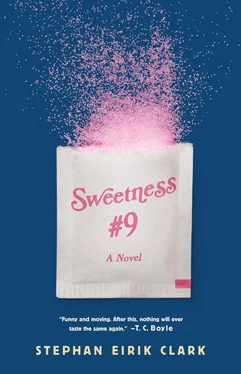How is this possible, you say? How could I have so thoroughly erased my past that I no longer had any fears at all about the safety of this food additive? Perhaps memory is like a book written in ink that fades. Perhaps every time I thought back on what I’d observed in Animal Testing, I discovered another alarming passage had been removed, allowing me to pen a more hopeful one in its place. I’m sure the victims of any great trauma would agree it shouldn’t be any other way. For if not by forgetting, how else are we to recover and find peace?
Then again, maybe this is all too forgiving, and I was simply being pragmatic. After all, more and more of the flavorings I was creating at work were going into products containing Sweetness #9. It was a matter of utility and survival to think as I did. I had a wife and kids to support. I couldn’t regret; I couldn’t succumb to anguish and doubt. I had to act like one of the strap-down men responsible for securing the prisoner before he receives the lethal injection. I had to concentrate on the task at hand (just secure the left leg), because to think of the big picture, to see how my work contributed to a larger whole…only madness could be found there.
So I concentrated on my job and didn’t let my thinking push out beyond the confines of my test tube. It was easy, and I suppose in this regard I was no different from my mentor. Like him, I wouldn’t have worried about what was going on behind the barbed-wire fence on the outside of town; I would have joined the masses in the streets, lured by the spectacle of the parade and all the wild cheering. A good German, content never to speak about the war, or at least those parts best kept to oneself — this is who I had become, and it served me well, too.
My life improved. I bought a set of golf clubs and a new Volvo every three years. I felt better. Where once I had suffered under the weight of anxiety and guilt, now I believed I was rightfully reaping the benefits of a lifetime of dedicated work. Shortly after my son Ernest was born, Betty and I even closed on our dream home, a two-story Colonial Revival on a tony tree-lined street in the best neighborhood of South Battle Station Township. Topped by a side-gabled roof and covered in white wooden siding, this five-bedroom house had dramatic Tuscan columns that framed a wide front door crowned by an elegant swan’s-neck pediment.
By the time we were settling into it, Betty had nursed our son through his first three months and landed a job as a tourism development analyst for a company recently relocated to downtown Battle Station, not far from where I worked. To accommodate her new career, we acquired the services of a housekeeper, a plump and affable woman who had escaped persecution in her native Guatemala and been recommended to us by a lady Betty met in aerobics class. Aspirina Barriga Gómez del Campo Martínez moved into the small bedroom in the back of our home, and soon was just another member of the family. She always had a pot simmering on the stove, and if ever she suspected one of us of harboring a dietary deficiency, she was quick to corner the offending party in the kitchen and make herself clear with a few fierce movements of a slotted spoon.
We had the best of both worlds: home-cooked meals and satisfying careers. On the weekends, we’d often celebrate this fact by having friends, family, and co-workers join us for a fancy dinner or a barbecue. Aspirina would be there to clean up and help out, but Betty and I always took the lead, cooking in between glances at a recipe in a glossy magazine. If someone was with us for the first time and impressed by the view (our home overlooked a state park thick with trees), I’d mention that at almost three hundred feet above sea level, we stood higher than all but a few points in Middlesex County. I’d say this as off-handedly as possible, but while lifting a glass to make a toast or cleaning the barbecue grill afterwards, I’d recall these words and feel a warm flush of satisfaction. Higher than all but a few points in Middlesex County… It wasn’t just a geographic statement, I thought; it was a metaphoric one.
I recall one such day when I felt so enthused. It was the fall of 1994, not long after the Flav-R-Savr tomato had debuted in our local supermarket, and more than a dozen of us had gathered round the barbecue on the patio in back. Tennessee and his wife, Jean, were there, as were the Ikedas from across the street and the Wilsons from next door. It’s the Wilsons I remember most. They brought their daughter that evening, a mopey girl with long, lanky hair who had just returned from some fresh trauma. I don’t recall the whispered particulars; nor did I make any mention of them in the diary I had started to keep in the Reagan years.* Despite this, I know her misfortune left me acting overly cheery in her presence, as if to compensate for the abortion or stint in rehab she had suffered.
If eating is still as communal as it was during the fire-driven days of the Stone Age, the Wilson girl did everything she could to show us that she wanted nothing to do with our company. When I announced to the crowd that we were enjoying the bounty of the world’s first commercially grown genetically modified crop, she set down the tongs she’d been holding and moved away from the wooden salad bowl with an empty plate. “You’ve got to eat something,” her mother said, but no, while Priscilla crunched through her own bowl of lettuce and chopped tomatoes, and Ernest made quick work of a hot dog that Aspirina had slathered in ketchup for him, the Wilson girl sank into a saggy lawn chair at our periphery and sulked like some grim figure in a Russian novel. “It’s Frankenfood,” she said.
As her parents apologized by offering me a pained look, I smiled and raised my voice so it’d reach the girl. “You shouldn’t be afraid of progress and new ideas, you know. Why, even your regular everyday tomatoes are picked green to prevent bruising and spoilage during shipping. They only get their traditional red color”—and here I smiled round at all my guests—“and that’s all it is, you know, a tradition, they only get that way after the distributor has gassed them with ethylene.”
I had hoped this would reassure her, but instead the girl popped up from her chair and said she was going for a walk, which we all understood to mean a smoke. I must admit, it felt good to have a hushed conversation with her father near the end of that evening, for while telling him he shouldn’t worry, that it was just a phase all children had to go through, I imagined myself lucky in comparison. When the Wilsons left (and they didn’t even wait for the hand-cranked ice cream that the Ikedas had brought over), young Ernest was popping up from Aspirina’s lap and biting into a quartered tomato. “It’s alive! It’s alive!” he said, as he staggered around the deck like a little Frankenstein’s monster, growling through his red mouthpiece as he held out his stiffened arms. Priscilla, then twelve, laughed as loudly as anyone. She looked radiant, too, sitting there on the bench flanking the barbecue with one leg folded underneath her pleated cheerleader’s skirt. I’d picked her up from the sidelines of Harper Field earlier that day, and ever since she’d been half popping into her moves and silently mouthing the words to one of the chants that had inspired the seventh-grade football team to its 35–7 win: “W-I-N! South Battle Station, do it again!”
Betty, her hair and shoulders still as big as in the eighties, must have felt as delighted as I did, because after everyone had left and we were alone together in the backyard, she looped her arm around my side and turned us toward the western horizon, where the sinking sun was casting a red glow across the treetops of the state park.
“Isn’t it lovely?” she said, and though she could have been speaking of the view (some days you could see all the way to the far-off fields of West Windsor Township, where Orson Welles’s Martians had landed back in the 1930s), I’m sure she meant more than that.
Читать дальше












